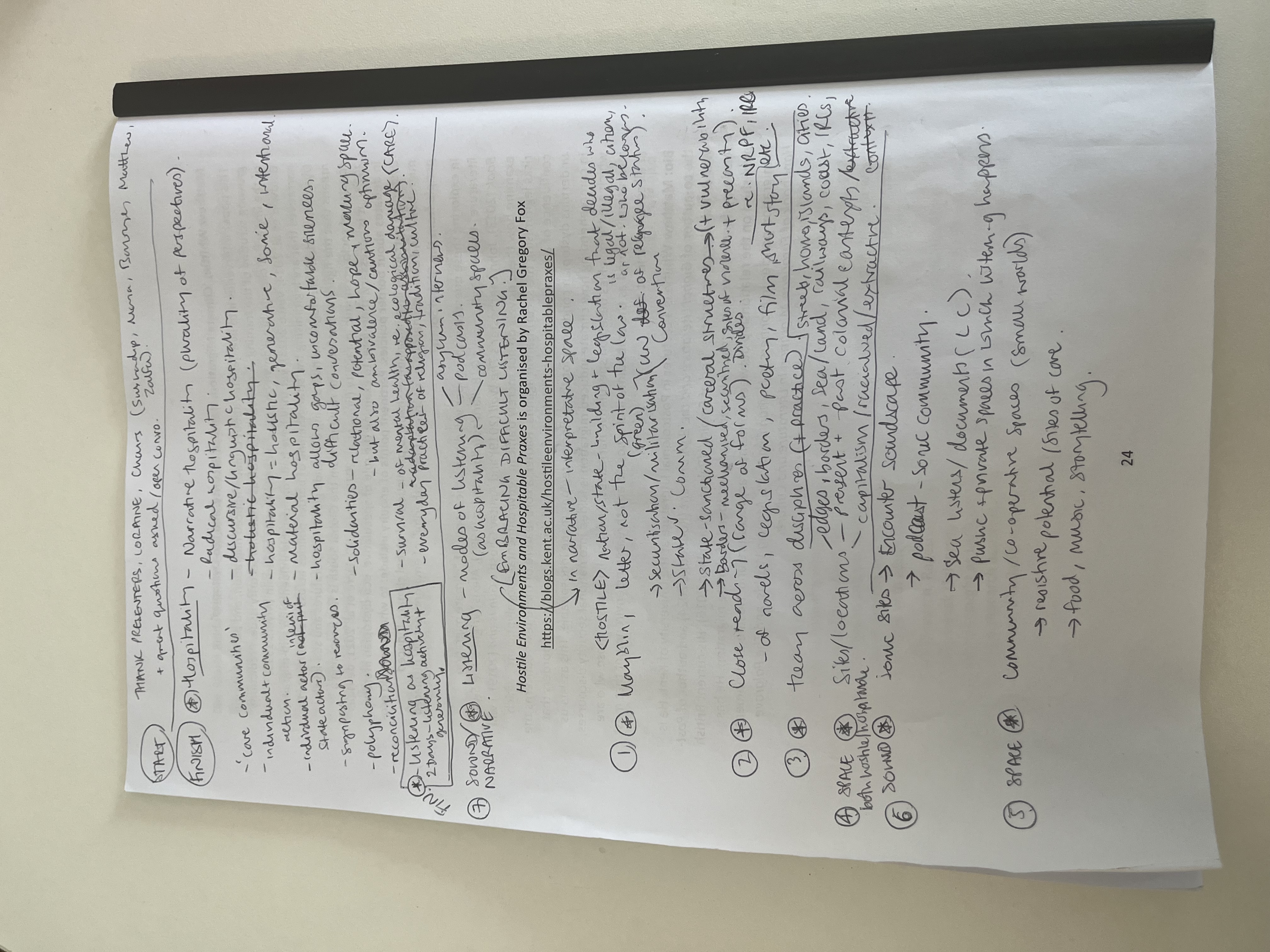Closing Remarks
At the close of the conference, I delivered some final remarks, from some roughly drafted notes made across the back of my programme. Here they are, typed up, more orderly, but still, I hope, worthy of capturing the generative ideas shared throughout the conference.

Thank You
First, to thank all the people who contributed to the conference. This includes everyone who presented conference papers, those who chaired panels (Zalfa Feghali, Bahriye Kemal, Subhadip Mukherjee, Maria Ridda, and Matthew Whittle), and everyone who contributed questions and conversations as part of Q&As and between panels. I also want to thank keynotes Dr Agnes Woolley and Leah Cowan, whose presentations set the tone each morning of the conference, and whose research showcases increasingly relevant interventions on the subject of Hostile Environment policy and on putting hospitable praxes into action. I want to thank Loraine Masiya Mponela, for starting the conference off with her formative poetry, and for showcasing the capacity that art and community has for affecting positive change. Thank you also to the University of Kent’s Conferences and Events team, who kept us fed and caffeinated, and the Leverhulme Trust, whose funding meant it was possible for this conference to be free to attend, and thus opening its doors open to wider participation from academics and practitioners.
Hostile Environments
I start, here, with hostile environments—their configuration in law, in rhetoric, and in action. Presentations drew back to how hostile environments, in the UK, and elsewhere, are built out legal and rhetorical formations of the nation state, which decides who is a citizen and who is not, who is legal and who is not, who belongs and who does not. Hostile environments are located in state-sanctioned systems that reinforce and guard border spaces, via mechanised securitisation, militarisation, and carceral structures (including Immigration Removal Centres). Borders represent sites of violence and division that create and deepen the conditions of vulnerability and precarity experienced by people living amongst migration communities.
Literary and Cultural Responses
Presenters engaged with an array of different literary and cultural sources, including novels, poetry, film, short stories, legislation, ethnography, and podcasts. Papers spanned disciplines, engaging with interdisciplinary theoretical and ethical thinkers, and focusing on the relevance and importance of individual- and community-based practice.
Space and Creating Places of Hospitality
A number of different spaces were invoked throughout the conference, in light of both past and present colonial contexts. This included the theorising of borders and edges; rumination on the journey across land and sea; focus on sites of transit, including railways and coastlines; provocations on the ‘island’ in political discourse; notes on carceral settings, including Immigration Removal Centres; as well as discussion on the ways that homes, streets, and cities can be both familiar and unfamiliar, hostile and hospitable.
And in response to the ways in which space is divided, capitalised, racialised, extracted from, and bordered, presenters engaged with the various ways space can be imbued with hospitality. This included the creation (consciously or otherwise) of community co-operative spaces: spaces—or ‘small worlds’—that were homely, companionable, and safe. These spaces were engendered by the practice of sharing—of sharing food, music, stories, and time and/as a resource, through the provision of material and emotional support. And through these co-operative moments of exchange, such spaces exhibit resistive potential. As sites of care, these spaces represent places of hospitality.
Sound and the Politics of Listening
There were also numerous sonic sites represented over the course of the conference. These included the aural soundscape captured in the film documentary Encounter; the rigid and increasingly bureaucratised and mechanised format of the formal asylum interview; the evocation of the sea as a body of water that listens to and documents those who enter it; and the sonic community evoked from the listeners of podcasts. At the close of the conference, its audience, too, joined this sonic community, as Zalfa Feghali and Gillian Roberts recorded an episode for their podcast, Borders Talk: Dots, Dashes, and the Stories They Tell.
Listening became a central pillar of our discussions. The disjunction—generative or otherwise—of private and public listening (or, in the case of people listening to podcasts with earphones, private listening in public spaces). Listening represented a potential vehicle for hospitable praxes, most notably by embracing the practice of difficult listening, that is, the value of listening with care; listening to people share stories that are difficult for them to share, for us to hear; accepting gaps and pauses and silences through our listening; and to grapple with new truths that might challenge our own preconceived ideas.
Hospitality
Hospitality was at the centre of this conference. To close, I list the numerous ways in which hospitality and hospitable praxes were invoked across the two days:
- Narrative hospitality; a plurality of perspectives; polyphony.
- Radical hospitality.
- Linguistic hospitality.
- Material hospitality.
- Hospitality that is holistic, generative, intentional.
- Hospitality that manifests via the allowance for uncomfortable silences and difficult conversation; reconciliation.
- Everyday practices rooted in religion, tradition, and culture.
- Practices of care (and self-care) that are predicated on survival; of protecting mental and physical health; of preventing ecological damage.
- Signposting to resources (material and emotional) and/or the facilitation of these resources.
- Individual and community actions that operate counter to, and in spite of, state-sanctioned bureaucratic, securitised, and carceral actions.
- Solidarities that are relational, which make space, and engender hope, as well as cautious optimism.
At its close, the conference felt representative of the practice of listening as hospitality. It was a space where contributors listened to each other actively and generously, and where the conversations that such listening prompted might pave the way for individual and community learning and action.
Rachel Gregory Fox
30 June 2025
